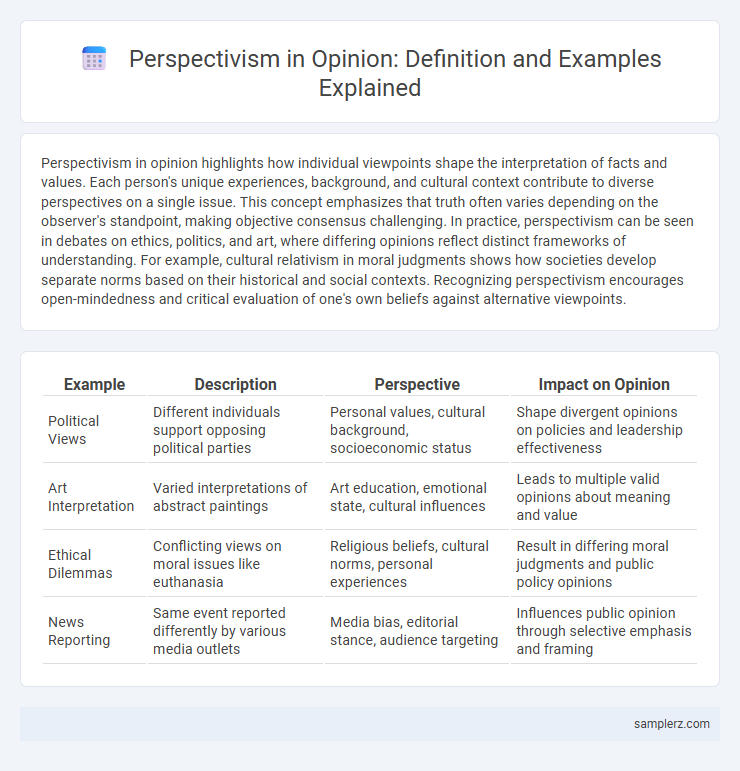Perspectivism in opinion highlights how individual viewpoints shape the interpretation of facts and values. Each person's unique experiences, background, and cultural context contribute to diverse perspectives on a single issue. This concept emphasizes that truth often varies depending on the observer's standpoint, making objective consensus challenging. In practice, perspectivism can be seen in debates on ethics, politics, and art, where differing opinions reflect distinct frameworks of understanding. For example, cultural relativism in moral judgments shows how societies develop separate norms based on their historical and social contexts. Recognizing perspectivism encourages open-mindedness and critical evaluation of one's own beliefs against alternative viewpoints.
Table of Comparison
| Example | Description | Perspective | Impact on Opinion |
|---|---|---|---|
| Political Views | Different individuals support opposing political parties | Personal values, cultural background, socioeconomic status | Shape divergent opinions on policies and leadership effectiveness |
| Art Interpretation | Varied interpretations of abstract paintings | Art education, emotional state, cultural influences | Leads to multiple valid opinions about meaning and value |
| Ethical Dilemmas | Conflicting views on moral issues like euthanasia | Religious beliefs, cultural norms, personal experiences | Result in differing moral judgments and public policy opinions |
| News Reporting | Same event reported differently by various media outlets | Media bias, editorial stance, audience targeting | Influences public opinion through selective emphasis and framing |
Understanding Perspectivism in Modern Opinion Pieces
Modern opinion pieces showcase perspectivism by emphasizing the multifaceted nature of truth, illustrating how individual experiences shape subjective viewpoints. Writers often present contrasting perspectives to highlight the diversity of interpretations surrounding social, political, and cultural issues. This approach encourages readers to critically evaluate their own biases and fosters deeper comprehension of complex topics through the acknowledgment of multiple realities.
How Perspectivism Shapes Personal Beliefs
Perspectivism shapes personal beliefs by highlighting how individual experiences and cultural backgrounds influence the interpretation of facts and events. This philosophical approach emphasizes that truth is not absolute but varies according to different viewpoints, leading to diverse opinions on the same subject. Understanding this dynamic fosters empathy and encourages open-mindedness, recognizing that each belief system reflects a unique perspective on reality.
Real-World Examples of Perspectivism in Journalism
Journalism often exemplifies perspectivism through diverse reporting on the same event, reflecting different cultural, political, or social viewpoints that shape narrative framing and public perception. For instance, coverage of international conflicts varies significantly between Western and non-Western media outlets, highlighting contrasting priorities and values. These distinct perspectives underscore perspectivism's role in shaping how audiences interpret news, emphasizing the importance of consuming multiple sources for a balanced understanding.
Perspectivism vs. Objectivism: Opinion Article Insights
Perspectivism emphasizes the idea that opinions are inherently shaped by individual perspectives, highlighting the subjective nature of truth unlike Objectivism, which asserts that truths exist independently of personal viewpoints. This philosophical contrast is evident in opinion articles where authors interpret facts based on cultural, experiential, or ideological contexts, illustrating how personal lenses influence understanding. Recognizing perspectivism fosters critical engagement with diverse viewpoints, challenging the absolutism often promoted by objectivist stances.
Perspectivist Approaches in Social Media Debates
Perspectivist approaches in social media debates reveal how users interpret the same topic through diverse cultural, ideological, and experiential lenses, resulting in varied opinions. Algorithms that personalize content feeds intensify these multiple viewpoints by reinforcing individual perspectives and creating echo chambers. This dynamic complicates consensus-building by highlighting the subjectivity of truth in digital discourse.
Perspectivism in Cultural and Political Opinions
Perspectivism in cultural and political opinions highlights how individuals interpret events and values through distinct social, historical, and ideological backgrounds, shaping diverse worldviews. This approach reveals that truth and morality are not absolute but contingent on varying perspectives, influencing debates on nationalism, identity politics, and cultural relativism. Understanding perspectivism encourages empathy and critical analysis by acknowledging the multiplicity of legitimate viewpoints in cultural and political discourse.
Case Studies: Perspectivism in Editorial Columns
Editorial columns often illustrate perspectivism by presenting diverse viewpoints on complex issues such as climate change, immigration, and economic policy, highlighting the subjective nature of truth in public discourse. Case studies reveal how columnists interpret the same facts differently based on ideological, cultural, or social perspectives, influencing reader perception and dialogue. This approach underscores the role of perspectivism in shaping opinion formation and critical thinking within media consumption.
The Role of Perspectivism in Shaping Public Discourse
Perspectivism plays a crucial role in shaping public discourse by highlighting how individual viewpoints influence interpretation of facts and events. It underscores that opinions are inherently subjective, shaped by cultural, social, and personal contexts, which fosters a diverse marketplace of ideas. Recognizing multiple perspectives encourages critical thinking and helps mitigate polarization by promoting empathy and understanding across different viewpoints.
Analyzing Perspectivism Through Diverse Opinion Writers
Analyzing perspectivism through diverse opinion writers reveals how individual backgrounds and experiences shape varied interpretations of the same event. Opinion pieces by writers such as Ta-Nehisi Coates, Noam Chomsky, and Roxane Gay highlight the role of cultural, political, and social contexts in framing perspectives. This diversity underscores that opinions are not absolute but inherently subjective, filtered through unique worldviews and values.
The Impact of Perspectivism on Audience Perception
Perspectivism shapes audience perception by emphasizing that all opinions are influenced by individual experiences, cultural backgrounds, and subjective interpretations. This approach encourages critical thinking as audiences recognize the validity of multiple viewpoints rather than accepting a singular narrative. The impact of perspectivism fosters open-mindedness and dialogue, allowing diverse perspectives to coexist and enrich collective understanding.

example of perspectivism in opinion Infographic
 samplerz.com
samplerz.com